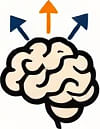Developing a High-Agency Mindset Through Adaptive Learning Exercises
 by Max Miller
by Max Miller
Explore practical drills and strategies with adaptive learning exercises to build a high-agency mindset. These approaches empower ambitious individuals to take control, adapt quickly, and drive personal growth through actionable steps and daily routines.

Adaptive learning exercises offer a pathway to foster a high-agency mindset, where individuals actively shape their outcomes rather than waiting for change. These exercises emphasize flexibility and self-directed action, making them ideal for professionals and those committed to self-improvement.
The Basics of Adaptive Learning and High-Agency Thinking
At its core, adaptive learning involves adjusting methods based on feedback and results. This approach helps build a high-agency mindset by encouraging proactive decisions. For instance, adaptive learning starts with setting clear, achievable goals that evolve with new insights.
In practice, begin with simple drills like daily reviews. Spend 10 minutes each evening reflecting on what worked and what didn't. This routine strengthens personal control and prepares you for challenges ahead.
Key Drills for Building Adaptability
One effective drill is the "rapid adjustment" exercise. Here, you face a small task, such as solving a problem under time constraints, and then modify your strategy based on the outcome. This builds resilience and a sense of agency by turning setbacks into learning opportunities.
Another drill involves role-playing scenarios. Imagine facing a work obstacle, like a project delay, and practice different responses. By testing various options, you develop the ability to act decisively, which is crucial for high-agency mindset in professional settings.
Strategies for Daily Implementation
To integrate these exercises, create a weekly plan with specific actions. For example, dedicate Mondays to goal reassessment and Wednesdays to feedback analysis. This structured yet flexible routine ensures steady progress.
Consider pairing exercises with tracking tools, such as a journal, to monitor improvements. Over time, this practice reinforces self-reliance and helps ambitious individuals stay motivated.
Overcoming Common Barriers
Many encounter resistance when starting new routines, but adaptive learning addresses this through iterative steps. Begin with low-stakes exercises, like adapting a daily habit, and gradually increase complexity. This method promotes sustained effort and personal development without overwhelming you.
For professionals, apply these strategies in team settings. During meetings, suggest quick adaptation drills, such as brainstorming solutions on the spot. This not only enhances group dynamics but also cultivates individual agency.
Real-World Applications and Success Stories
In fields like business and education, adaptive learning exercises have led to notable achievements. Individuals who regularly engage in these drills report greater confidence and better results. For instance, a professional might use adaptive techniques to pivot career paths, turning uncertainty into opportunity.
The key is consistency. By incorporating these exercises into your routine, you transform abstract ideas into tangible skills. Remember, each small win builds toward a stronger, more empowered self.
Advanced Techniques for Long-Term Growth
Once basics are mastered, explore layered strategies. Combine adaptive learning with visualization exercises, where you picture successful outcomes and plan adjustments. This deepens your commitment to self-improvement and ensures lasting change.
Focus on community involvement too. Share your progress with peers to gain external perspectives, which can refine your approaches and reinforce a high-agency approach.
In conclusion, adaptive learning exercises are essential tools for anyone seeking to develop a high-agency mindset. Through consistent practice and strategic application, you can achieve meaningful personal and professional growth.
